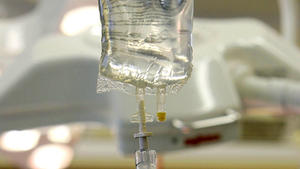Public healthNine die in Alabama from infected IVs
Alabama public health officials are currently investigating the deaths of nine patients who received intravenous nutrition from contaminated feedbags; officials say that the intravenous nutrition solution, called total parenteral nutrition (TPN), contained Serratia marcescens bacteremia, which leads to a bacterial infection in the blood; investigators have traced the source of the contaminated intravenous nutrition feed bags to the pharmaceutical supplier Meds IV; the bacteria is commonly found and it is difficult to specifically link the organisms that killed the nine patients to those found at Meds IV facility

Intravenous TPN bag // Source: aolnews.com
Alabama public health officials are currently investigating the deaths of nine patients who received intravenous nutrition from contaminated feedbags.
Officials say that the intravenous nutrition solution, called total parenteral nutrition (TPN), contained Serratia marcescens bacteremia, which leads to a bacterial infection in the blood.
A total of nineteen patients have received TPN.
Dr. Jim McVay, a senior official with the Alabama Department of Public Health, said, “Of the 19 that received the substance, nine of those are no longer living … These were very fragile individuals and it’s not clear whether the bacteria contributed to their deaths.”
Investigators have traced the source of the contaminated intravenous nutrition feed bags to the pharmaceutical supplier Meds IV. Officials have found the same bacteria that led to the patients deaths at its facilities.
But, according to Dr. Donald Williamson, the director of Alabama’s Department of Public Health, the bacteria is commonly found and it is difficult to specifically link the organisms that killed the nine patients to those found at Meds IV facility.
Serratia marcescens is commonly found in most houses around toilets and faucets.
Officials are currently testing the bacteria found at the pharmacy to determine if they were the cause of death.
Williamson said that the tests are “basically like fingerprints.”
When the bacteria was first detected in patients, Meds IV was immediately notified. The pharmacy subsequently warned its customers of the potential contamination and on 24 March it issued a recall of all its IV products.
Alabama hospitals have also stopped using TPN received from the pharmacy.
While the investigation is still ongoing, the families of several patients have filed wrongful death lawsuits.
